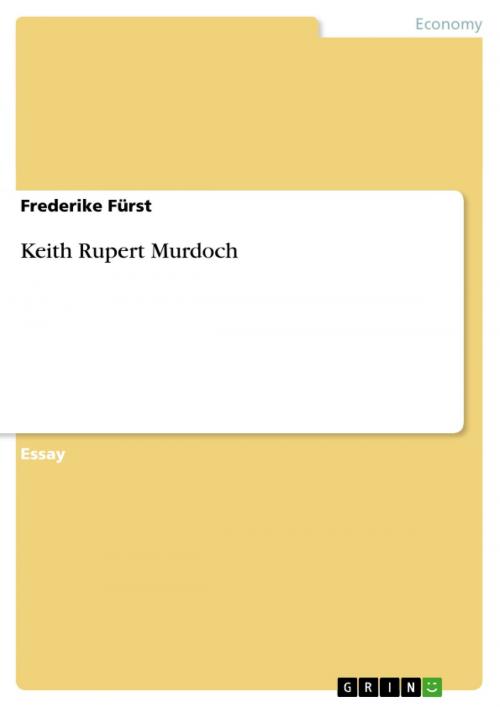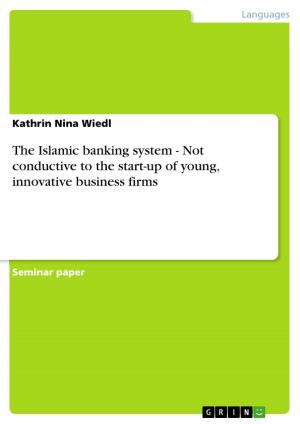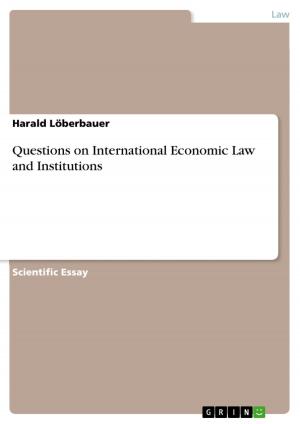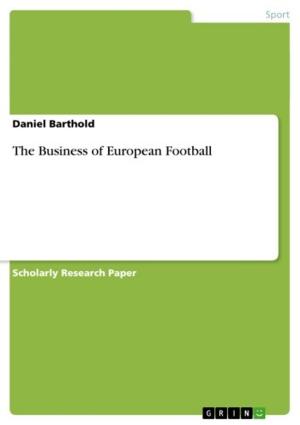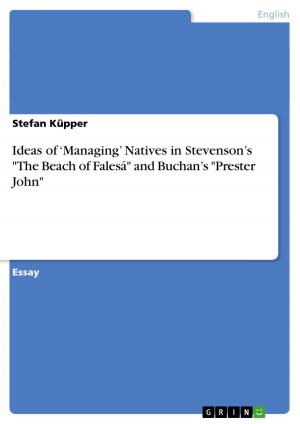| Author: | Frederike Fürst | ISBN: | 9783638399609 |
| Publisher: | GRIN Publishing | Publication: | July 19, 2005 |
| Imprint: | GRIN Publishing | Language: | English |
| Author: | Frederike Fürst |
| ISBN: | 9783638399609 |
| Publisher: | GRIN Publishing |
| Publication: | July 19, 2005 |
| Imprint: | GRIN Publishing |
| Language: | English |
Essay from the year 2003 in the subject Business economics - Business Management, Corporate Governance, grade: 1, Anglia Ruskin University, course: Principales of Management, 11 entries in the bibliography, language: English, abstract: Dominating, manipulating, never sentimental about business, keeps you on your toes, right-wing, a gambler, a catalyst for change, a dictator, a tyrant, and the greatest dealmaker of our time. These are all descriptions for the successful entrepreneur I have selected for discussion: Rupert Murdoch. Born on 11th March 1931 in Melbourne, Australia, Rupert Murdoch was influenced by his parents, the Presbyterian Church, the Geelong Grammar School and the Flemington Race Course. Rupert Murdoch is a person with a love for business, in particular of the newspaper business, a passion he inherited from is father, Sir Keith Murdoch. His father's family were enthusiastic members of the Free Church of Scotland. Rupert Murdoch's mother gave him his love of risk-taking and a fiery determination. The Flemington Race Course was the first place where he started to gamble. 'He contains within his character both an extraordinary gambling instinct and a certain dour Puritanism,' as William Shawcross (1992) describes him. (cited in Crainer 2002 p.4) Rupert Murdoch studied economics at Oxford University's Worcester College. After he graduated in 1952 he worked as sub-editor at Lord Beaverbrook's Daily Express. The same year he inherited the Adelaide News from his father. What Murdoch inherited was no empire; it was a small regional newspaper, but he already had the energy and the will to conquer the mass market. He was very young when he was thrown in to the business, he had to make his own mistakes as well as deal with management all by himself. Early responsibility, the opportunity to learn and to make mistakes is, perhaps, one of the secrets to his success (Crainer 2002 p.6).
Essay from the year 2003 in the subject Business economics - Business Management, Corporate Governance, grade: 1, Anglia Ruskin University, course: Principales of Management, 11 entries in the bibliography, language: English, abstract: Dominating, manipulating, never sentimental about business, keeps you on your toes, right-wing, a gambler, a catalyst for change, a dictator, a tyrant, and the greatest dealmaker of our time. These are all descriptions for the successful entrepreneur I have selected for discussion: Rupert Murdoch. Born on 11th March 1931 in Melbourne, Australia, Rupert Murdoch was influenced by his parents, the Presbyterian Church, the Geelong Grammar School and the Flemington Race Course. Rupert Murdoch is a person with a love for business, in particular of the newspaper business, a passion he inherited from is father, Sir Keith Murdoch. His father's family were enthusiastic members of the Free Church of Scotland. Rupert Murdoch's mother gave him his love of risk-taking and a fiery determination. The Flemington Race Course was the first place where he started to gamble. 'He contains within his character both an extraordinary gambling instinct and a certain dour Puritanism,' as William Shawcross (1992) describes him. (cited in Crainer 2002 p.4) Rupert Murdoch studied economics at Oxford University's Worcester College. After he graduated in 1952 he worked as sub-editor at Lord Beaverbrook's Daily Express. The same year he inherited the Adelaide News from his father. What Murdoch inherited was no empire; it was a small regional newspaper, but he already had the energy and the will to conquer the mass market. He was very young when he was thrown in to the business, he had to make his own mistakes as well as deal with management all by himself. Early responsibility, the opportunity to learn and to make mistakes is, perhaps, one of the secrets to his success (Crainer 2002 p.6).
